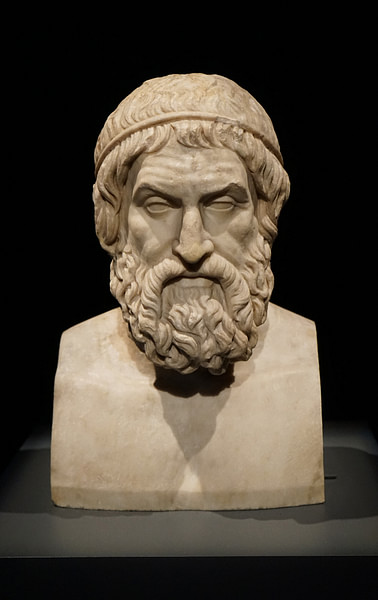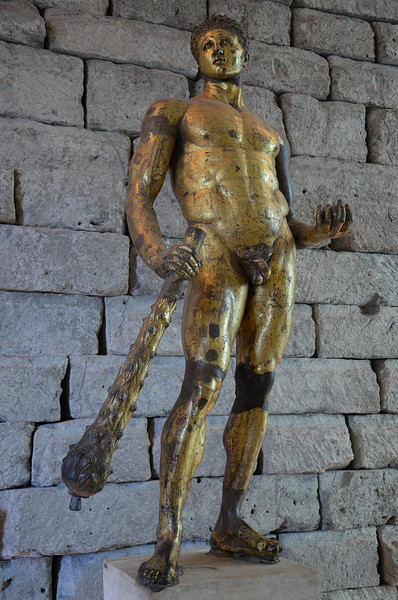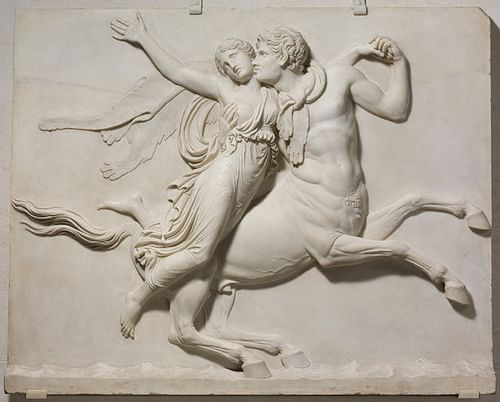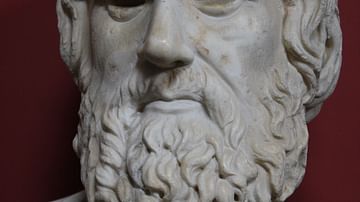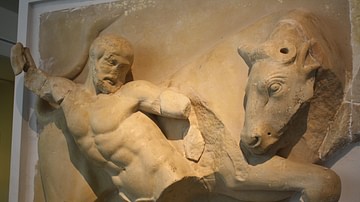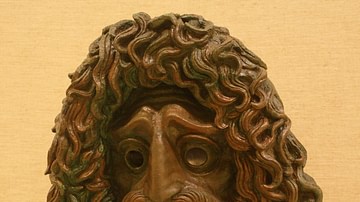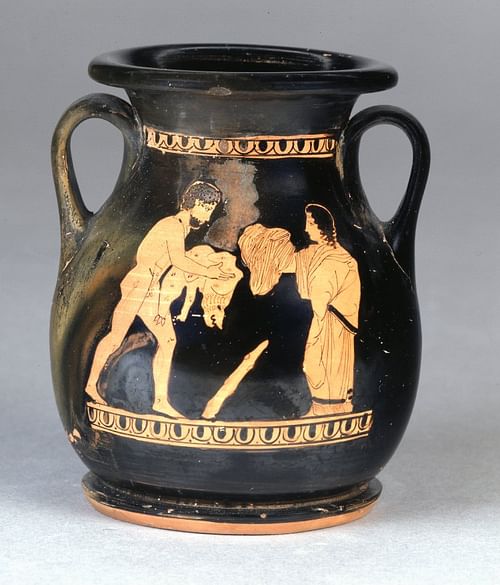
Women of Trachis is a Greek tragedy, one of Sophocles' (c. 496 BCE - c. 406 BCE) lesser-known works, the only one that does not deal with the aftermath of the Trojan War, rather it is concerned with the death of the Greek hero Heracles (or Hercules). As with many of the tragedies of the time, the audience was quite familiar with the story of Heracles, his wife Deianira, and his eventual demise on a funeral pyre atop Mt. Octa. In this version of the story, Heracles is away from his home in Trachis. Deianira, concerned for her long-absent husband, sends their son Hyllus in search of him. A messenger appears with news of Heracles' defeat of King Eurytus and sack of Oechalia. Shortly afterwards, the herald Lichas arrives with a number of female prisoners, among them the beautiful Iole, daughter of King Eurytus, the concubine of Heracles. Mistakenly believing it would rekindle his love for her, Deianira sends her husband a robe soaked in the blood of the centaur Nessus. Unfortunately, the robe proves to be fatal and Heracles returns home in agony, dying. When she learns the truth of the poisonous robe, Deianira commits suicide. As he lies dying, Heracles begs his son Hyllus to burn his body atop Mt. Octa and marry Iole.
Sophocles
Sophocles was born into a wealthy family in the deme or suburb of Colonus outside the city of Athens c. 496 BCE. Unfortunately, aside from a few fragments, only seven of his 120 plays remain in existence. Among his few surviving works is the trilogy of Oedipus the King, Oedipus at Colonus, and Antigone. He wrote all of his plays as his beloved city was embroiled in the Peloponnesian War against Sparta. Besides being a noted tragedian, he was motivated to become extremely active in Athenian political life, serving as a treasurer (hellenotamias) in 443-42 BCE and a general 441-40 BCE. When he was in his eighties, he was named in 412-11 BCE as a member of a group of special magistrates (proboulos) assigned to the unfortunate task of organizing both financial and domestic recovery after the disastrous Greek defeat at Syracuse. Despite his role in Greek government, his plays rarely contain any references to current events or issues; something that makes the dating of his plays difficult.
In his book Antiquity, historian Norman F. Cantor states that Sophocles' conception of tragedy is “played out within the individual.” (130). In The Greek Way, classicist Edith Hamilton said that the beauty of his plays was in their simple, lucid, and reasonable structure. She wrote that “He has imposed himself upon the world as the quintessential Greek, and the qualities pre-eminently his are ascribed to all the rest” (198-199). Along with Aeschylus and Euripides, he represents the epitome of Greek tragedy. Among his closest friends were the historian Herodotus and the statesman Pericles. He had two sons, Iophon by his wife Nicostrate and Ariston (also called Sophocles) by his mistress Theoris. Both sons would eventually become minor playwrights.
Cast of Characters
- Deianira
- Nurse
- Hyllus
- Chorus of Trachian Women
- Messenger
- Lichas
- Old Man
- Iole
- Captive Women
- Guards
- Attendant
- Bearers
The Play
The play opens as Heracles' wife Deianira exits her palace in Trachis. She recounts her life before she met Heracles, the man who rescued her:
A happy ending - if happy it was - I became Heracles' bride, but still I'm haunted by one fear after another, in endless fretting for him. Night follows night, and worry succeeds worry. (16)
Heracles is rarely home and only occasionally sees his children. She constantly wonders where he is. Her nurse, apologizing for being a slave who speaks out, advises her to send her son Hyllus to search for him. Upon his arrival, Hyllus admits to having heard rumors about his father: “For all of the past twelve months they say he has worked as a slave for a Lydian woman” (17). Upon his release, he raised an army and went to Euboea against King Eurytus of Oechalia. Deianira speaks of an oracle:
... either Heracles would end his days or else this exploit would be followed by a life of happiness for ever after. His fate lies in the balance, my dear son. So won't you go to help? His life and safety mean our safety, or we've lost with him. (17)
Speaking to the chorus, Deianira expresses her lingering distress.
When Heracles went from here on his last journey, he left behind an ancient tablet, inscribed with mystic letters. [Later it is revealed that the tablet foretold of his death.] He'd never mentioned it before, when he'd gone off on one of his labours. His thoughts were on success, never on death. This time he spoke as though his end had come. [...] This, he declared, Fate had ordained should mark the last of Heracles' labours. (20)
This eerie premonition caused her to suffer nightmares. Deianira believes the time had come. As she speaks a messenger arrives with news of her husband. Heracles is alive and would be returning home. She is elated. Amid her joy, a herald, Lichas, appears along with a number of soldiers and captive women. Among the women is a quiet young girl, Iole. Lichas tells Deianira that Heracles is still in Euboea consecrating the ground for Zeus. Deianira is confused: was he still there on an oracle's orders and who are women?
He made a vow when he planned to take and uproot the country of these women you see before you. … these were the ones chosen for his household slaves or temple servants. (23)
They are now the property of Deianira. Lichas speaks of Heracles' service as the slave to the Lydian queen, Omphale. Incensed because of a number of insults he has received, he killed the son of King Eurytus. Zeus was angry and decreed that he be sold into slavery. After his year of service, he gathered an army and marched against King Eurytus. After Heracles completes his sacrifice he will return home. Deianira is pleased to hear of her husband's return but fears that their good luck may be reversed.
I, my friends, feel deeply sorry to see these ill-starred prisoners, here in a foreign land, exiles who've lost their fathers and lost their homes, the daughters of free men, maybe, but now condemned to a life as slaves. (24)
Deianira approaches one of the girls and asks Lichas about her, but he avoids the question: “She has been in misery over her wretched lot, endlessly crying her eyes out” (25). Obviously concerned, the messenger asks to speak to Deianira in private. He tells her that the herald is lying:
I heard that man declaring, before a host of witnesses, this: It was all for that beautiful girl that Heracles sacked Oechalia's lofty towers and conquered Eurytus. Love was the only god to charm him to do with penal servitude out in Lydia… (26)
Upon Lichas' return, she confronts him, however, he remains reluctant to tell the truth. She insists, and finally, the herald concedes:
Yes, it is just as this man says; the girl inspired the terrible passion that shot through Heracles. She was the cause that led to her father's desolate realm, Oechalia, facing capture and ruin. (31)
He admits, however, that it was his decision, not Heracles', to hide the truth. Lichas begs her to accept the girl. Deianira turns to the chorus:
This girl, no longer an innocent girl, I think, is now installed. I've allowed her to come on board … to destroy my peace of mind. Now there are two of us under a single blanket, awaiting the arms of a single lover. (33)
She claims not to be angry but admits that her own beauty is fading. She speaks of a gift of years earlier, a gift from the centaur Nessus. Heracles killed him with an arrow dipped in the blood of the Hydra of Lerna and he told her to take the blood from his wound. Believing the centaur's blood was a love charm and would win Heracles' love (this is what the centaur told her), she soaks a tunic in it and places it in a casket. She tells Lichas to take the casket to Heracles, but the tunic should not be exposed to the sun. He leaves.
Later, Deianira has doubts. She explains how a piece of wool that had been soaked in the blood had disappeared. If her husband dons the tunic then he must die, too. As she speaks Hyllus appears. Speaking to his mother, he wishes her to be dead. He tells her of how Heracles had put on the tunic she had sent. “A convulsing pain came over his limbs and gnawed right into his bones.” (41) Hyllus accuses his mother of murder. Distraught, Deianira enters the palace. Shortly afterwards, the nurse exits the palace and announces that she killed herself. Hyllus is grief-stricken; he understands that his words drove her to suicide. Finally he is told the truth behind the bloody tunic from one of the servants.
The play turns to Hyllus and Heracles lying in agony. He rebukes his son:
What cruel wrong you have done me, wrong! To face this eruption of madness which cannot be charmed away! (49)
Only Zeus can help him. He asks for someone to burn his body or put a sword to him; however, neither his attendant nor Hyllus can do it. First, he prays to Athena then asks his son to pity him and draw his sword. In agony, he asks for Deianira: “Fetch that woman from home and pass her into my clutches with your own hands” (51). He begs to be shone pity. Hyllus consoles his father. He tries to explain that Deianira had been led astray and that now she is dead, having committed suicide. He speaks of her jealousy of Iole and how she only wanted to win his love. Heracles requests to see his mother and children but is told they are not there. Heracles finally decides to reveal his last wishes. He speaks of a prophecy of the dead killing the living; Nessus (the murdered centaur) has killed him. The fallen hero asks his son to promise to cremate him on Mt. Octa and to marry Iole. Hyllus reluctantly agrees to do his duty. In the end, Heracles is taken away followed by a sad but obedient son.
Conclusion
Women of Trachis has been called one of Sophocles' most puzzling works. For one, it is difficult to date because it does not reveal any connection to political or social events. Its primary concern is the death of the Greek hero Heracles, a myth with which most in the audience would have been familiar. Secondly, the play appears to be in two parts: the first is concerned with the plight of Heracles' wife Deianira and her eventual suicide while the second part reveals the agony of Heracles and his wishes to die on Mt. Octa. Deianira is a sympathetic character, wishing only to regain her husband's love while Heracles appears to be a little selfish, sending his concubine home to Trachis. Unfortunately, both characters come to an unhappy ending.

